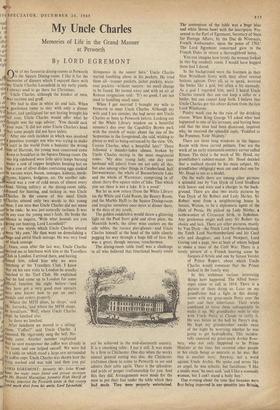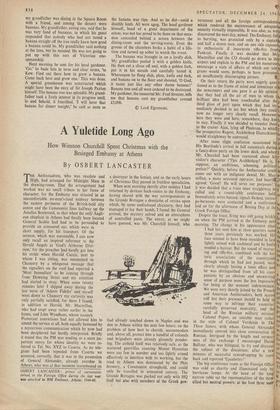My Uncle Charles
Memories of Life' in the Grand Manner at Petworth By LORD EGREMONT
(-NNE of my favourite dining-rooms at Petworth esmemories of dinners which I enjoyed there with rdi"I always used to go there for Christmas. ide my Uncle Charles Leconfield in my early youth. ,1) jis the Square Dining-room. I like it for the Pr° Uncle Charles, although the kindest of men, th Was taciturn and gruff. di We had to dine in white tie and tails. When okc a gentleman came to stay with only a dinner Vil'iacket, and apologised for not having brought his ou tail coat, Uncle Charles would offer what he ,00 thought was the sage advice : 'You should sack .Y Your man.' It did not enter Uncle Charles's head
that some people did not have valets.
sig After one such incident in which was involved 'ere a penniless younger son who was trying to make th a start in the world from a bedsitter the wrong side of Harrods, the young man concerned came down to breakfast in the Square Dining-room. On one big sideboard were little spirit lamps burning Under a row of copper hotplates keeping hot on Ls. top a row of silver dishes containing eggs cooked iris In various ways, bacon, sausages, kidneys, mush- ' ,Pooms, kippers, kedgeree, etc. On another side- dl board was a row of cold meats of almost every hi kind. Sitting solitary at the dining-room table, ' dressed for hunting, and tucking in, was Uncle ndl Charles. In the course of this meal Uncle II Charles uttered only two words to this young ca Man. I am sure that Uncle Charles did not mean .surl to be rOde : he was just naturally taciturn. It was
in any case the young man's fault. He broke the -se silence to inquire, 'With what hounds are you sic going out hunting, Lord Leconfield?'
The two words which Uncle Charles uttered yo
Were 'My own.' He then went on demolishing a :o
ladl huge and awful black sausage. He was very fond of black sausage.
lac Once, soon after the last war, Uncle Charles ise invited me to luncheon with him at the Travellers an Club in London. I arrived there, and having
found him, asked him why we were lunching at the Travellers Club. I knew that on his rare visits to London he usually lunched at the Turf Club. He explained that he had come up to London for some official function the night before—`and they have got a very good man upstairs here who knows how to put on one's Medals and orders properly.'
`Where the MFH dines, he sleeps,' said Mr. Jorrocks, 'and where the MFH sleeps, he breakfasts.' Well, where Uncle Charles slept, he lunched also.
So there we lunched.
After luncheon we moved to a sitting- room. 'Coffee?' said Uncle Charles. I in assented. He vigorously rang the bell. No-
body came. Another member ' explained that to'save manpower the coffee was already in the room and one helped oneself. We were led to a table on which stood a large urn surrounded by coffee cups. Uncle Charles was shown how the thing worked and was told 'and then you put
-._ LORD EGREMONT: formerly Mr. John Wynd- I ham; for many years friend and private secretary le to Mr. Harold Macmillan; formerly High Sheriff of Sussex; inherited the Petworth estate in that county
threepence in the saucer here.' Uncle Charles started fumbling about in his pockets. He tried them all—trouser pockets, jacket pockets, waist- coat pockets—without success: no small change to be found. He turned away and with an air of Roman resignation said: 'It's no good, I am not used to handling small sums.'
When I got married I brought my wife to Petworth to meet Uncle Charles. Although my wife and I are cousins, she hail never met Uncle Charles or been to Petworth before. Looking out of the White Library window on a beautiful summer's day over the Capability BroWn park with the stretch of water about the size of the Serpentine in the foreground, she said, wishing to please as well as being entranced by the view, 'Oh, Cousin Charles, what a beautiful lake!' There followed a thunder-laden silence, broken by Uncle Charles saying in the most magisterial tones : 'My dear young lady, one day your husband will inherit from me not only all this, but also among other things in Cumberland, half Derwentwater, the whole of Bassenthwaite Lake and the whole of Wastwater, comprising in all about thirty-five square miles of lake. That which you see there is not a lake. It is a pond.'
But let us now return (from the White Library via the White and Gold Room, the Beauty Room, and the Marble Hall) to the Square Dining-room and imagine ourselves once more at dinner there, in the days of my youth.
The golden candelabra would throw a glittering light on the Paul Storr gold and silver plate, the Monteith bowls, the silver wine coolers on the side tables, the rococo pier-glasses—and Uncle Charles himself at the head of the table silently pegging his way through, a huge bill of fare. He was a great, though morose, trencherman.
The dining-room table itself was a challenge to all who believed that functional beauty could
not be achieved in the mid-nineteenth century. It is a smashing table : I use it still. It was made by a firm in Chichester. One day when the works annual general outing was due, the Chichester craftsmen chose to come to Petworth to see and admire their table again. There is the splendour and pride of proper craftsmanship for you. And this they did. Arrangements were made for the men to put their feet under the table which they had made. They Were properly entertained. The centrepiece of the table was a huge blue and white %vres bowl with the inscription 'Pre-
sented to the Earl of Egremont, Secretary of State for Foreign Affairs, by the Duc de Nivernois, French Ambassador, upon the peace of 1763: The Lord Egremont concerned gave to the French Duke in return a thoroughbred horse.
You can imagine how lovely the women looked in this big candlelit room. I would have hugged them had I dared.
In the background were the footmen in their blue Wyndham livery with their silver crested buttons agleam. Over all, so to speak, hovered
the butler like a god, but often a bit unsteady. As a god I regarded him, until I heard Uncle
Charles remark that one can keep a cellar or a butler, but one cannot keep both. I believe that Uncle Charles got this obiter dictum from the late Lord Wimborne.
Pantry work can be the ruin of the drinking classes. When King George VI asked what had
happened to one of his servants, and having been told that the man had been dismissed, inquired why, he received the splendid-reply, 'Fuddled in the Presence, Your Majesty.'
There are three long windows in the Square Room with three carved pelmets. Two are the work of an early nineteenth-century carver called Ritson. The third is the work of Mr. Hoad, my grandfather's cabinet-maker. Mr. Hoad decided that a mallard should be his main subject. My grandfather obligingly' went out and shot one for Mr. Hoad to use as a model.
On the walls there are among other pictures a splendid one by Van Dyck of Lord Strafford with lances and tents and a charger in the back- ground. There are also two exotic pictures by Van Dyck of Sir Robert and Lady Shirley. Sir Robert went from a neighbouring house in Sussex, Wiston, to be a diplomatic agent of the Shah of Persia. He picked up Lady Shirley, a noblewoman of Circassian birth, in Isphahan. Any gentleman might well envy Sir Robert his choice and luck. There are other pictures, mostly by Van Dyck—the Ninth Lord Northumberland, the Tenth Lord Northumberland and his Cecil wife and daughter; and Lord Newport, Lord Goring and a page, two at least of whom helped to make a mess of the Civil War. There is a lovely picture of a French hunting scene by Jacques d'Artois and one by Simon Verelst of Prince Rupert, about which Uncle Charles would comment that the Prince looked in the family way.
In this ambience various interesting things have happened. The Allied Sover- eigns came to call in 1814. There is a picture of them doing so. Later on my grandfather had a fight in this dining- room with my great-uncle Percy over the port and their inheritance. Their wives combined to force them subsequently to make it up. My grandfather went to stay with Uncle Percy at Clouds to ratify it. He was bitten in the hall by Percy's dog. He kept ' my grandmother awake most of the night by worrying whether he was going to get hydrophobia. This inciden-
tally annoyed my great-uncle Archie Rose- bery, who not only happened to be Prime Minister at the time, but resented other people in his circle being as neurotic as he was. But that is another story. Anyway, not a word against Uncle Archie. He spoke and wrote like an angel, he was eclectic, but fastidious; 'I like a manly man,' he once said, 'and I like a womanly woman, but I can't stand a boily boy.'
One evening about the time that bananas were first being imported in any quatitity into Britain, my grandfather was dining in the Square Room with a friend, and among the dessert were bananas. My grandfather, eating one, said that he was very fond of bananas, to which his guest responded that nobody who had not tasted a banana straight off the tree really knew how good a banana could be. My grandfather said nothing at the time, but he minded. He was not going to put up with this sort of Victorian one- upmanship.
Next morning he sent for his head gardener. 'Go,' he bade him in terse and clear terms, 'to Kew. Find out there how to grow a banana. Come back here and grow one.' This was done. A special greenhouse was constructed which might have been the envy of Sir Joseph Paxton himself. The banana tree was splendid. My grand- father took a lively interest in its progress until, lo and behold, it fructified. 'I will have that banana for dinner tonight,' he said as soon as
the banana was ripe. And so he did—amid a deathly hush. All were agog. The head gardener himself, head of a great department of the estate, was not too proud to be there on that occa- sion concealed behind a screen between the dining-room and the serving-room. Even the groom of the chambers broke a habit of a life- time and turned up sober to watch the event.
The banana was brought in on a lordly dish. My grandfather peeled it with a golden knife. He then cut a sliver off and, with a golden fork, put it in his mouth and carefully tasted it. Whereupon he flung dish, plate, knife and fork, and banana on to the floor and shouted, '0 God, it tastes just like any other damn banana!' Banana tree and all were ordered to be destroyed. My gardener, the immortal Mr. Fred Streeter, tells me that banana cost my grandfather around £3,000.
© Lord Egremont.































 Previous page
Previous page